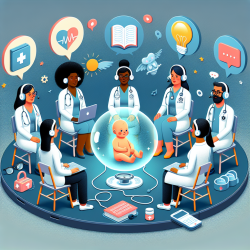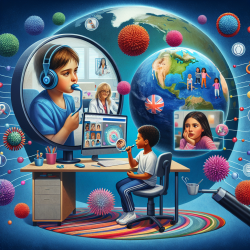Unlocking the Power of Open-Minded Thinking for Practitioners
In the realm of speech-language pathology, the quest for improved outcomes for children is paramount. A recent study, "Individual Mental Abilities vs. the World’s Problems," by Jonathan Baron, sheds light on the critical role of Actively Open-Minded Thinking (AOT) in addressing complex societal issues. This concept is not only relevant to global challenges but also holds significant potential for enhancing the skills of practitioners working with children.
The Essence of Actively Open-Minded Thinking (AOT)
AOT is a cognitive style that emphasizes the importance of considering diverse perspectives and evaluating evidence objectively. It encourages individuals to engage in a balanced search for information, weigh different viewpoints, and make informed decisions. In the context of speech-language pathology, AOT can empower practitioners to approach each child's unique needs with a broader understanding and a willingness to explore innovative solutions.
Implementing AOT in Practice
Practitioners can harness the power of AOT by incorporating the following strategies into their daily practice:
- Encourage Diverse Perspectives: Engage with colleagues, parents, and other professionals to gain insights from various angles. This collaborative approach can lead to more comprehensive assessments and interventions.
- Foster a Culture of Inquiry: Cultivate an environment where questioning and curiosity are valued. Encourage children to ask questions and explore new ideas, fostering their cognitive development.
- Evaluate Evidence Objectively: When designing interventions, rely on evidence-based practices. Critically assess the available research and adapt strategies to suit individual needs.
- Reflect on Personal Biases: Be aware of personal biases that may influence decision-making. Actively seek out information that challenges preconceived notions and encourages growth.
The Impact of AOT on Child Outcomes
By integrating AOT into their practice, practitioners can create a more inclusive and effective therapeutic environment. This approach not only benefits children by providing tailored interventions but also enhances the practitioner's ability to adapt to evolving challenges. AOT fosters a mindset of continuous learning and improvement, ultimately leading to better outcomes for children.
Encouraging Further Research
While the study by Jonathan Baron provides valuable insights, it also highlights the need for further research into the application of AOT in various fields, including speech-language pathology. Practitioners are encouraged to explore additional studies and contribute to the growing body of knowledge on this topic. By staying informed and engaged, practitioners can continue to refine their skills and improve outcomes for the children they serve.
To read the original research paper, please follow this link: Individual Mental Abilities vs. the World’s Problems.










